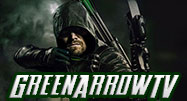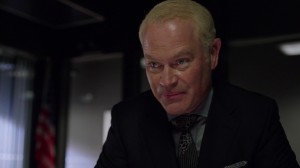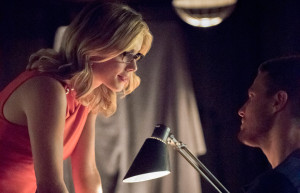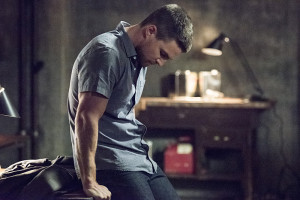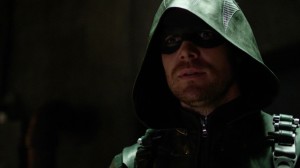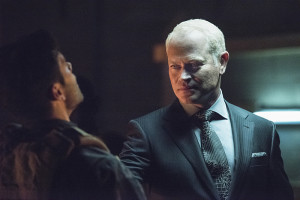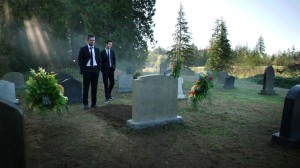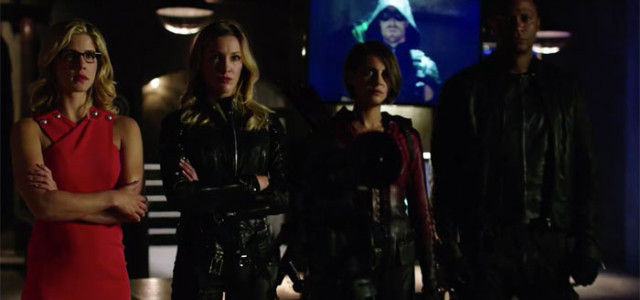
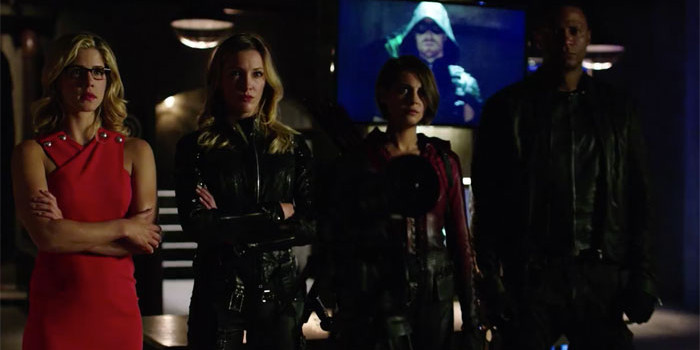
Arrow #4.1: “Green Arrow” Deep Review
Recaps & Reviews October 10, 2015 Matt Tucker

Summary: A strong opener introduces a season that seems to have a better understanding of itself.
If you have not seen this episode yet and do not wish to be spoiled, do not continue reading!
For a full episode synopsis, grab a read of our Quickshot Recap: #4.1: “Green Arrow”
Review
It’s a Green light to vanquish the Darhk!
Sure, the name is borrowed from the comic book source material and certainly teems in the spirit of that environment, but there’s something a bit cheesy and outlandish to Oliver Queen facing off against Damien Darhk in a personification of bringing light to darkness as this year’s central theme. Yet, despite its on-the-nose qualities, such operatic terms are how the show functions best. And if there’s one thing that can be said about this premiere, which scored the series’ best first episode ratings since the series premiere back in 2012, it’s that it’s a return to form.
The show has the unenviable task of trying to rebound from a polarizing year that, even though it saw a ratings spike over Season 2, managed to turn a number of fans off. Even before last season wrapped, hints and allegations about changes to the show began to filter their way into the public consciousness. Some, such as hewing a little closer to the comic origins, were welcomed while others, like a shift in the tone of the series to a purported “lighter” one, had long-time viewers a bit concerned. The positive in all of it was there was a decided buzz about the series to carry us through the summer.
Still, the proof is in the proverbial pudding. Kicking off your rejuvenated season with an episode titled “Green Arrow” is certainly a bold statement. We were told from the beginning of the series that Oliver had to earn the colorful modifier to his vigilante name, and they weren’t sure just when in his journey that might happen. Following Roy stepping in to free Oliver’s name being linked to the Arrow by the public, and everyone believing both Roy and the Arrow to have perished, a new name was a necessity.
In fact, if ever there were a time for the show to reinvent itself, this is it.
They had worked to systematically tear down Oliver’s life last season, and when he and Felicity bug out of town, it really is a clear delineation between what has happened before and what is to come. Upon their return, Oliver finally sees the outcome, the aftermath of his and Ra’s al Ghul’s actions, in addition to those of Danny Brickwell. His family’s company is gone, and along with it his own fortune. The majority of Team Arrow’s work over the last couple of years was undone during Brick’s drive to become King of the Glades, and a good number of the criminals freed are likely still out on the streets. The team’s base of operations was outed and ransacked, ending its viability. And not only was the Arrow persona killed but his campaign was tarnished, torn back down to a killer and gruesome vigilante that the city could no longer trust.
Citizens are scared and they are leaving in droves. The leaders, still without a mayor, even took to renaming the city Star City, in theory to honor the perceived passing of Ray Palmer but really an attempt to change their image and start fresh. And like Springfield’s Monorail, what better way to excite people than a bullet train running the 600 miles direct to Central City.
Reinvention is the name of the game, and the show has nowhere to go but up. That reinvention starts with our hero himself. Even with a continued focus on growing the supporting cast, the show has never lost sight that this is Oliver’s story, and as Oliver goes so goes the show. Here we have an Oliver who is lighter in the sense that the weights and pressures he lugged upon his shoulders and around his neck are gone. He’s decidedly freer, and though he doesn’t have much more direction in his life at the moment than learning to cook and making nice with the neighbors in their cul-de-sac, he really seems at peace. He’s even removed the duplicate of Shado’s tattoo that Slade Wilson forced onto his shoulder blade, a tangible letting go of the past.
Olicity
A big part of that peace is, of course, his relationship with Felicity.
It goes without saying that “Olicity” is arguably the most polarizing aspect of the series for fans. It’s a love it or hate it proposition, and the focus on it last season played a huge factor in the divisiveness in the response to the season on the whole. (Without question, though, plotting and consistency of the writing were the biggest issues with Season 3.) I personally found the “romance” forced and juvenile, troublesome because it took away from each character individually. So, it was with trepidation that I approached this season given that Olicity is the status quo.
But you know what? It works this hour. The pairing still doesn’t set my world on fire; as a romantic at heart, that’s a bit disappointing. Yet, the chemistry between Stephen Amell and Emily Bett Rickards has always been fun and pleasant, and both characters are happy. That’s a huge improvement over last season, and as the relationship forms a foundation for this year, that’s vital to this shift to a lighter tone. It’s understandable why Oliver is ready to put a ring on it; there is comfort and partnership there. It’s also written more mature, which is hugely welcome. When Oliver calls Felicity out for having worked with the team behind his back during the months they’ve been away, their discussion is charged but funny, charming, and productive. Neither side is bullheaded and they actually work through the issue together.
Oliver and Diggle
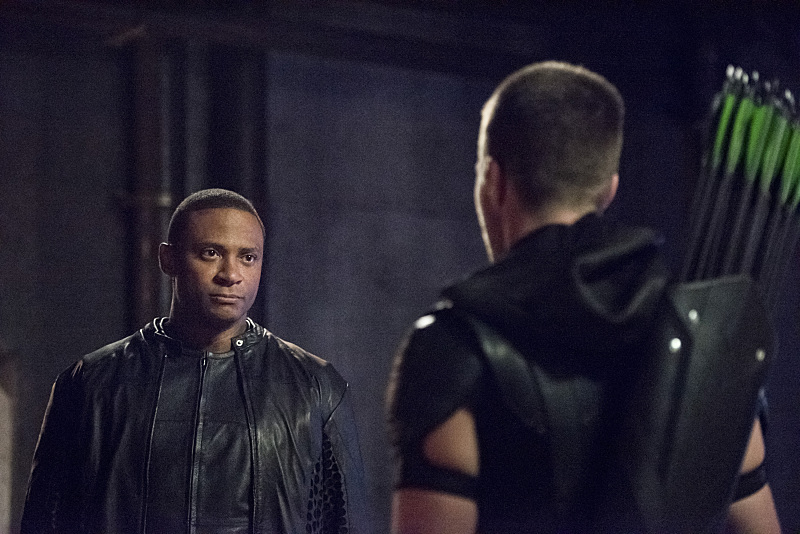
The same can’t be said of the relationship between Oliver and Diggle. Though Oliver is starting from a place of peace and reinvention is in the air, that doesn’t mean that there aren’t consequences and repercussions of the past to deal with. The strained bonds between Diggle and the guy he termed a brother and named Best Man for his wedding angle for the biggest fallout. While it initially seems a bit stubborn and principled on Diggle’s part — even Lyla, whom Oliver had kidnapped and potentially put her and baby Sara in danger to sell Ra’s on his loyalty to the League, is understanding and forgiving of Oliver’s actions — their exchange in the train station reveals a fundamental schism.
If everyone is being honest, this is something that has been stewing under the surface of their friendship and partnership from near the beginning. Diggle has frequently absorbed a lot of his issues with Oliver because he believed in what Oliver was doing and in the good inside the man he thought he’d always seen. There were points this came to a head: Diggle walking away just prior to the Undertaking because he felt Oliver didn’t treat Diggle’s motivations for joining him with the same priority; their frequent clashes over Oliver’s blind devotion to family and his sometimes misplaced loyalty to Laurel; his complete distaste for Helena Bertinelli and initial issues with Sara Lance as a result, to name a few. While the anger of what his supposed friend and confidant did to Lyla is very relatable, it’s that deep-seated feeling of distrust that really fires Diggle’s aggressive animosity.
Character motivations aside, this is shaping up to be a big Diggle year for the show, which is something we’ve anticipated and craved since the first season. Finally picking up the the threads of the H.I.V.E. storyline and delving into why his brother Andy had to die is essential to the very heart and fabric of the series, and the prospect of it all is quite exciting. While Diggle recognizes that Oliver can be useful to their cause, he doesn’t have to like it. It’s the perfect kind of material for David Ramsey and Amell to play. The friendship is an important element of the chemistry of Team Arrow and giving the two something fundamental rather than surface is not only substantial for the actors, who do good work with it this episode, but for the season as a core conflict. Yes, Diggle saves Oliver’s life because he’s a good person, but he wants little to do with his former friend because he thinks that he’s not a person who can trust or even love because of a darkness similar to those they fight against that is intrinsic to Oliver’s makeup. That’s a powerful struggle.
Monsters & Darkness
This is important because it talks to Oliver’s character arc for the season. If the narrative central theme is overcoming darkness with light, Oliver’s is learning how to do what he does without having to slip into the darkness that fueled him for many years of his life. It’s reasonable that Oliver would be wary of climbing back into the hood; he doesn’t know another way yet. Yes, the show has dealt with some of this in the past, particularly with Oliver deciding that he didn’t need to kill to accomplish his goals as the Arrow. There is more to it, though, and given the way the city quickly turned on the Arrow last year, it’s not only a worthwhile arc but far more tangible than last year’s ill-defined existential crisis with identity.
It also provides a way to contrast Thea’s story. She’s dealt with her own demons over the years, as well as being raised in the same environment of secrets that produced Oliver, and being the legitimate daughter of a sociopathic schemer and now head of a clandestine group of trained killers. Still, while she has had tragedy in her life, she hadn’t faced the same kind of horrors that her brother survived, and was relatively naive. That all changed when she was brainwashed into being a killing pawn, and then all but killed by Ra’s al Ghul only to be resurrected in the Lazarus Pit. The effects of that are beginning to peak out through her personality now, and the concern is that she become a creature of the dark just as Oliver finds his way into the light.
Barry Allen spoke last year about Oliver Queen inspiring people as himself, which didn’t quite work out. The Arrow, though, was a tool, a necessary evil to combat the growing evil in their city. The people accepted him because he got things done, but it’s fair to say that they weren’t rushing to throw Flash Day-like events for their costumed guardian angel. Oliver addressing the people directly by TV broadcast still seemed a bit weird for the character, but stating his goal to be a beacon of hope was necessary for the city and for Oliver’s own progression. It’ll be interesting to see how the city embraces this “Green Arrow.” He gives great credit to the team for taking up the mantle over the past 5-6 months, but will mentioning the Arrow and his cause backfire on him?
Quentin Lance certainly still sees him as a monster who broke the city open to these evils by showing up, and there’s clearly no love lost when Lance sees Oliver back in town. That argument about “escalation” that also formed a spine of the Nolan Dark Knight Trilogy is comics’ version of the chicken-egg debate. Oliver’s own journey was influenced by his time on Lian Yu — which makes the return there in the flashbacks somewhat appropriate — but his father’s list was the result of a darkness and evil that already existed in Starling City. The League of Assassins has existed for centuries, and Damien Darhk’s H.I.V.E. grew out of that after his rejection from being selected as Ra’s al Ghul. Slade Wilson, well… That’s not Oliver’s fault, per se, but it’s the singular example of him being intimately involved in that specific malady on the city.
The reality is that the kinds of threats Star City sees lend themselves to masked specialists to aid traditional law enforcement. Now, instead of dealing with the public at arms’ length, these heroes want to inspire to save the city’s soul. It’ll be interesting to see how they incorporate that into their efforts this year.
Mystical
The true monster would seem to be Damien Darhk, but unlike most monsters, he’s not hiding in the shadows, in the closets, under the beds. He strolls right into the meeting of the city’s acting heads and straight into our hearts. Okay, perhaps that’s a bit much, but one of the smartest choices to make on the season is to reveal the big bad right up front. He throws down the gauntlet and welcomes the challenge. As much as I liked Matt Nable’s Ra’s al Ghul last year, they really struggled with how to use him effectively until late into the season. One of the big course corrections was to address that problem right out of the gate. And in casting Neal McDonough for the part, they’ve nailed it.
Familiar with McDonough’s work, in particular this kind of villain role, I knew what to expect. That might seem a bit counteractive, though certainly the performance doesn’t reveal the plot, but he doesn’t disappoint. Even when the team stops the train with the bomb and Diggle gets the tranq dart jump on him, there never feels like a point where Darhk isn’t in control. What’s more is he’s charismatic, confident, and not afraid to take care of business himself. He’s not necessarily concerned with public perception of what he’s doing, though I wouldn’t put a PR campaign against the heroes out of the realm of possibility, but he’s unafraid of being open about it. Yes, his “Ghosts” use tactics to hide their strikes, but he doesn’t hesitate to own up to their actions. That’s a refreshing change.
What he does hide from the public, but not from Oliver when he faces off against him, is that he’s practiced in the dark arts of the mystical. The show briefly skirted the mystical realm last year with some of the ethereal League practices and specifically with the use of the Lazarus Pit. Given his past with the League, and the fact that he’s as old as the former Ra’s al Ghul with both having been conscripted into the League at the same time over 100 years ago, it shouldn’t come as a surprise that he deals in the realm, but he’s obviously gone further down that path than his deceased archrival. The coming appearance of John Constantine also bolsters the focus on magic and the mystical this year.
What’s a bit disconcerting, though, is that the flashbacks are set up to deal with Oliver’s introduction to these energies, actions, and aspects of the world. Last year, Amell mentioned that he approached the arrival of the Lazarus Pit as something Oliver might have come across in his past. Not the Pit, specifically, but the reality that something like it exists. That sets some groundwork for this being a factor of the flashbacks this season, but it can’t help but feel a bit too convenient given the focus on it in the present this year. This takes a page from the Mirakuru storyline from Season 2, which if it plays as strong as that year’s flashbacks and their connection to the present, we’ll not only be in for a treat but it will go a long way towards overlooking that convenience.
One should be thankful we didn’t lose Amanda Waller to the film division, even though the character appears in the upcoming Suicide Squad movie by way of actress Viola Davis and is expected to fill a role similar to the Marvel Cinematic Universe’s Nick Fury in the fledgling DCEU.
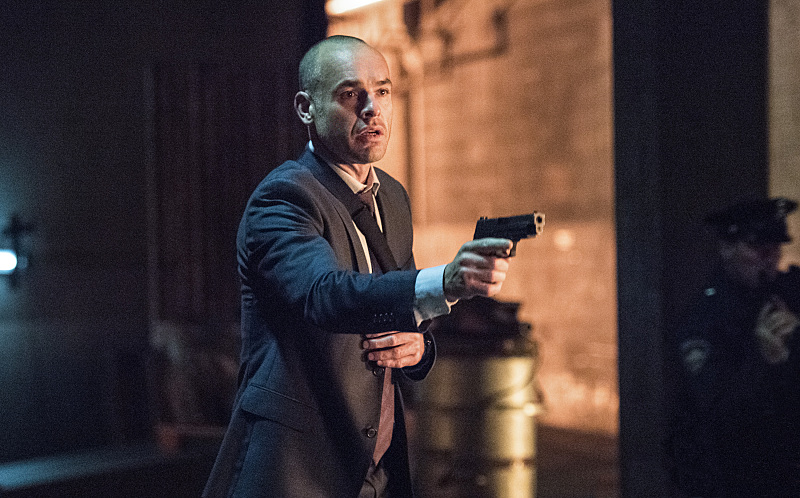
Perhaps the biggest twist of the hour was the “What the hell?!” reveal that Quentin is working with Darhk. Using the context to look back on the attacks, that Quentin survives the precinct raid, even with Black Canary’s intervention, makes a lot of sense. The Ghosts were able to dispatch the others in pretty easy fashion. Given Quentin’s character, it’s hard to think he bought into Darhk’s idea that city leadership should let the metropolis as they know it die so that they can start anew. Still, his motivations aren’t very clear. Is he that disgusted with the “masks” in the city that he wants to use Darhk to get rid of them and potentially any crazy evil that they might bring? Does his worry over Laurel add to that? It’s a head scratcher, but the kind of mystery that makes for a good seasonal plot.
Flash-Forward
The season’s main mystery deploys, to my recollection, the first flash-forward of the series. Flash-forwards are tricky, and it’s not entirely clear if this one was effective. Sure, it offers the biggest question coming out of the premiere. Just who is in the grave? And it is the kind of technique that causes a buzz and perhaps keeps people engaged. From that standpoint, of course it’s effective. But does the artifical drama caused by it work for the episode? It feels like a cheat, but I think a lot will depend on how it plays out.
What’s a bit mystifying is hearing word that the producers might not have decided just yet who is in the grave. One hopes this is just a bit of audience obfuscation, a chance to really play up the mystery. The thought that we’ll just go with a death and figure out who it is later seems like a rather sketchy way to break your story for the season. Makes one consider just what else is thinly laid out and how much worry should we have the season could go awry like last year.
I’m not going to speculate here who might be six feet under; honestly, it’s not the kind of mystery that gets me fired up. It’s become a pretty common TV trope, so I’ll just wait to get more clues and see how exciting or relevant it becomes. It is a little bit boring that for the second year in a row they cliffhanger the season with a prominent death, even if the two stories are told in dramatically different ways.
Conclusion
It’s a bit hard to call this opening chapter of the fourth season a rousing success, especially in light of the flawed but emotionally powerful The Flash season 2 opener the night before. Still, this was a good start with much more assured footing than last year’s kick-off, which bodes well for the coming season. Ample plot threads are established, and one has to enjoy that there are a mix of plot-intensive stories, as well as very deep character-focused conflicts like the Oliver-Diggle arc. The change in tone to the series is just subtle enough to allow life into the team’s new bunker without completely abandoning the identity of the series. And we have a credible and formidable threat in Darhk who impacts each and every one of our heroes.
“Green Arrow” is a strong refresh that should have fans excited and could well prove to be a great jumping on point for new viewers.
Odds & Ends
• Oliver and Felicity settled in Ivy Town. It’s not clear how near the burg is to Star City, but Ivy Town was the home of Ray Palmer/The Atom in the comics.
• I’m not sure how, but even with having seen the episode twice AND reading Craig’s advance review with a picture of it, I still completely missed the Green Lantern shoutout with the guy wearing the bomber jacket with the name “Jordan” on it in the Coast City bar during the flashbacks.
• I’m curious as to who the specific dark god was that Darhk was praying to and offering his blood sacrifice to rejuvenate his powers.
• Had to really enjoy the fact that Laurel had some stumbles as Canary as she was fighting off the Ghosts when they attacked the precinct. She has quite a number of competent moments throughout, which makes sense given the more experience she’s had over the last few months. But the stumbles add an authenticity. She still doesn’t have near the experience of either Diggle or Oliver, and it’s nice to see them acknowledge that. Black Canary continues to grow, though.
• Speaking of Black Canary, there’s a particularly cringe-inducing moment during the train station evacuation where Laurel helps a boy up and he comments on just how strong she is. Talk about making a point with a sledge hammer. Show us that Laurel is a strong, powerful woman as you do at various points in the episode rather than tell us, especially in dialogue that blatant.
• I love that it’s Felicity with the suburban bliss ennui, and that both she and Oliver choose to come back to Star City permanently because they recognize the purpose of this crusade in their lives.
• And how much of a knockout was Rickards the whole episode? Happy and funny Felicity definitely makes for a better show.
